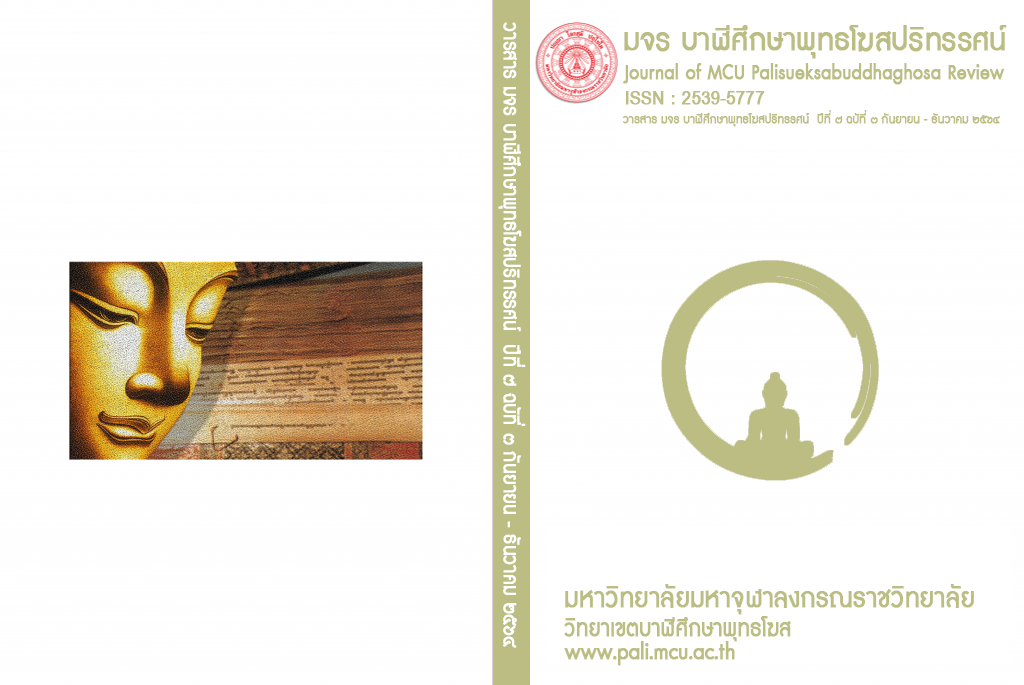สังเคราะห์องค์ประกอบภาวะผู้นำที่ยั่งยืนของผู้บริหารสถานศึกษา
Main Article Content
บทคัดย่อ
บทความวิจัยนี้มีมีวัตถุประสงค์เพื่อศึกษาองค์ประกอบภาวะผู้นำที่ยั่งยืนของผู้บริหารสถานศึกษา โดยการศึกษาจากเอกสารและงานวิจัยที่เกี่ยวข้อง จากนั้นนำผลในขั้นตอนที่ 1 มาสร้างเป็นโมเดลลิสเรล (Linear Structural Relationship model: LISREL model) ประเภทโมเดลการวัด (Measurement model) แล้วใช้การวิเคราะห์องค์ประกอบเชิงยืนยัน (Confirmatory Factors Analysis) ด้วยโปรแกรมลิสเรล ผลการศึกษาพบว่า องค์ประกอบภาวะผู้นำที่ยั่งยืน ที่เป็นกรอบแนวคิดเชิงทฤษฎี ที่ได้จากการสังเคราะห์มีจำนวน 27 องค์ประกอบ การวิจัยครั้งนี้ผู้วิจัยใช้เกณฑ์พิจารณาจากองค์ประกอบที่มีความถี่สูง (ความถี่ตั้งแต่ 10 ขึ้นไป) ได้องค์ประกอบจำนวน 10 องค์ประกอบ คือ 1) ความลุ่มลึก 2) ความยืนยาว 3) การกระจายอำนาจ 4) ความยุติธรรม 5) ความหลากหลาย 6) ความพร้อมด้านทรัพยากร 7) ความกล้าหาญและเด็ดขาด 8) ความอดทน 9) มีวิสัยทัศน์ และ 10) สร้างความไว้วางใจ แสดงเป็นโมเดลภาวะผู้นำที่ยั่งยืนเพื่อนำไปใช้ในการพัฒนาภาวะผู้นำของผู้บริหารสถานศึกษา
Article Details

อนุญาตภายใต้เงื่อนไข Creative Commons Attribution-NonCommercial-NoDerivatives 4.0 International License.
เนื้อหาและข้อมูลในบทความที่ลงตีพิมพ์ในวารสาร มจร บาฬีศึกษาพุทธโฆสปริทรรศน์ถือเป็นข้อคิดเห็นและความรับผิดชอบของผู้เขียนบทความโดยตรงซึ่งกองบรรณาธิการวารสาร ไม่จำเป็นต้องเห็นด้วย หรือร่วมรับผิดชอบใด ๆ บทความ ข้อมูล เนื้อหา รูปภาพ ฯลฯ ที่ได้รับการตีพิมพ์ในวารสาร มจร บาฬีศึกษาพุทธโฆสปริทรรศน์ถือเป็นลิขสิทธิ์ของวารสาร มจร บาฬีศึกษาพุทธโฆสปริทรรศน์หากบุคคลหรือหน่วยงานใดต้องการนำทั้งหมดหรือส่วนหนึ่งส่วนใดไปเผยแพร่ต่อหรือเพื่อกระทำการใด ๆ จะต้องได้รับอนุญาตเป็นลายลักอักษรจากวารสาร มจร บาฬีศึกษาพุทธโฆสปริทรรศน์ก่อนเท่านั้น
เอกสารอ้างอิง
กิติมา ปรีดีดิลก. (2532). การบริหารและนิเทศการศึกษาเบื้องตน. กรุงเทพฯ: อักษราพิพัฒน.
ทิวากานต์ ศรีสวัสดิ์ (2558). ภาวะผู้นำแบบยั่งยืนของผู้บริหารสถานศึกษา สังกัดสำนักงานเขตพื้นที่การศึกษามัธยมศึกษา เขต 19. วารสารศึกษาศาสตร์ มหาวิทยาลัยขอนแก่น, 38 (4), 57-64.
เทื้อน ทองแก้ว. (2545). ภาวะผู้นำ : สมรรถนะหลักของผู้บริหารในยุคปฏิรูป. วิชาการ, 5(9), 35-43.
ปภาวี พิพัฒนลักษณ์. (2557). กลยุทธ์การพัฒนาภาวะผู้นำของผู้บริหารโรงเรียนเรียนร่วมตามแนวคิดภาวะผู้นาที่ยั่งยืน เพื่อเสริมสร้างชุมชนการเรียนรู้ทางวิชาชีพ. วิทยานิพนธ์ครุศาสตรดุษฎีบัณฑิต สาขาวิชาบริหารการศึกษา บัณฑิตวิทยาลัย จุฬาลงกรณ์มหาวิทยาลัย.
พรทิพย์ อัยยิมาพันธ์. (2549). บทบาทภาวะผู้นำของข้าราชการไทยกับการพัฒนาประเทศอย่างยั่งยืน. จดหมายข่าวฉบับที่ 16 ประจำเดือน มิถุนายน 2549.
วาราดา ปวีณวัชร์. (2561). ตัวบ่งชี้ภาวะผู้นำแบบยั่งยืนสำหรับผู้บริหารโรงเรียนมัธยมศึกษา: การพัฒนาและทดสอบโมเดลความสัมพันธ์เชิงโครงสร้าง. วิทยานิพนธ์ครุศาสตรดุษฎีบัณฑิต สาขาวิชาการบริหารการศึกษา บัณฑิตวิทยาลัย มหาวิทยาลัยมหามกุฏราชวิทยาลัย.
วิเชียร ชิวพิมาย. (2539). องคกรแหงการเรียนรู้. กรุงเทพฯ: อักษราพิพัฒน์.
ศิริพงษ์ ศรีชัยรมย์รัตน์. (2542). กุญแจสู่ความเป็นเลิศทางการบริหารคน. กรุงเทพฯ: ซูม.
ธรรมรักษ์ การพิศิษฎ์. (2549). บทบาทภาวะผู้นำของข้าราชการไทยกับการพัฒนาประเทศอย่างยั่งยืน. จดหมายข่าวฉบับที่ 16 ประจำเดือน มิถุนายน 2549.
ศิริพงษ์ ศรีชัยรมย์รัตน์. (2542). กุญแจสู่ความเป็นเลิศทางการบริหารคน. กรุงเทพฯ: ซูม.
Acutt, N. (2008). The qualities of a sustainable leader. Retrieved from https://bit.ly/2NkiLft
Avery, G. C. and Bergsteiner, H. (2010). Honeybees and Locusts: The Business Case for Sustainable Leadership. Sydney: Allen & Unwin, 36-37.
Ceasar, N. (2011). Characterizing leadership for sustainable development. Retrieved from https://bit.ly/2tVYvJd
Courtice, D. P. (2014). Leadership for sustainability. Retrieved from https://www.cisl.cam.ac.uk/about/people/director
Davies, B. (2007). Sustainable leadership. In B. Davies (Ed.), Developing sustainable leadership (pp. 11-25). London: Paul Chapman Publishing.
Faruk, A. & Hoffmann, A. (2012). Five traits of sustainability leaders. Retrieved from www.bsr.org/en/our-insights/blog-view/five-traits-of-sustainability-leaders
Fullan, M. (2005). Leadership & sustainability: System thinkers in action. Paper presented for Hot Seat, England: Urban Leadership Community.
Hallinger, P., and Suriyankietkaew, S. (2018). Science mapping of the knowledge base on sustainable leadership, 1990–2018. Sustainability, 10(12), 4846. (SCOPUS index).
Hargreaves, A. (2005). Sustainable leadership. In B. Davies (Ed.), The Essentials of
http://dx.doi.org/10.5539/jel.v3n1p122
Kotter, J. P. (2012). Leading Change. Boston, Massachusetts: Harvard Business Review Press, 37-153.
Kross, K. & Kitazume, K. (2013). Five traits essential for sustainability leadership. Retrieved from https://bit.ly/2Kutsyj
Lambert, S. (2011). The perception and implementation of sustainable Leadership strategies in further education colleges. The Journal of Leadership Education. 11(2), 102-120.
Lynch, M. (2015). The seven principles of sustainable leadership. Retrieved from www.theedadvocate.org/the-seven-principles-of-sustainable-leader ship/
Nelson, J. (2011). What is corporate sustainability leadership?. Retrieved from https://bit.ly/2KIZaDS
Norlia, G. and Jamil, A. (2014). Attributes of School Leaders towards Achieving Sustainable Leadership: A Factor Analysis. Retrieved from
Peterlin, J., Pearse, N. J. and Dimovski, V. (2015). Strategic Decision Making for Organizational Sustainability: The Implications of Servant Leadership and Sustainable Leadership Approaches. Economic and Business Review, 17(3), 273-290.
Riedy, C. (2012). The characteristics of sustainability leaders. Retrieved from https://bit.ly/2IMs8Bc
Sander, G. T., Muriel, C. A. and Danielle, P. Z. (2013). Sustainable Leadership: Toward a Workable Definition. UK: Greenleaf Publishing, pp. 17-33. School Leadership (pp. 173-187). London: Paul Chapman Publishing.
Selma K. (2015). Examining the level of sustainable leadership practices among the managers in Turkish insurance industry. Retrieved from www.sciencedirect.com
Stanekzai, A. I. (2016). The characteristic of Leadership – Seven important traits. Retrieved from https://bit.ly/2tR6hUv
Visser, W. (2013). The seven habits of effective sustainability leaders. Retrieved from http://www.waynevisser.com/articles/7-habits-sustain ability-leaders
Yukl, Gary A. (1989). Leadership in organizations. New Jersey: Prentice-Hall.


